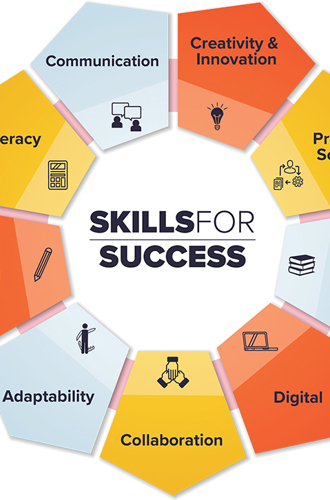Many of the skills you develop and use at university or college are designed to help you get a good education. But these same skills will also help you find a job, advance in your career, and build a better life for yourself.
These are skills you’ve picked up both in and outside of class. Every time you’ve done group work with classmates, you’ve improved your collaboration skills. If you’ve ever been up against a challenge while volunteering, you’ve used your problem-solving skills.
If you’ve held a part-time job, run for students’ council, or captained one of your school’s sports teams, you’ve developed even more of these skills.
Employers want your transferable skills
Employers want and need skills like the ability to collaborate, solve problems, or show leadership. Your job is to recognize your skills and market them in a way that will lead you to the career you want. They can fall into 2 groups:
The 9 skills for success
Researchers have identified 9 core skills for success. These are the building blocks that will help you adapt to change, learn new skills, and work well with others:
- Adaptability—knowing how to deal with change, learn new skills, stay positive, and not give up.
- Collaboration—working respectfully with others from different backgrounds, cultures, and countries.
- Communication—learning and sharing information by talking, listening, and interacting with others.
- Creativity and innovation—finding different and better ways to do things, being curious, thinking imaginatively.
- Digital—using digital technologies like computers, social media, virtual meeting platforms, and the internet.
- Numeracy—using mathematical information such as numbers, symbols, words, and graphics to do tasks like managing a budget.
- Problem solving—knowing how to identify an issue, find and implement a solution, and assess whether the situation has improved.
- Reading—using words, symbols, and images to find and share information.
- Writing—sharing ideas and information by using words, images, and symbols.
You already use and will continue to use many of these fundamental skills throughout your life—on the job, at home, and in social situations. Remember that we can all continue to improve in each of these areas.
Your personal traits and attitudes
In addition to the 9 skills, you’re also learning about your personal responsibilities while at school. Employers are looking for similar conduct—the way you behave and act—in the workplace. For example, can you:
- Plan and manage your time to achieve goals?
- Work without much supervision?
- Learn from your mistakes and accept constructive feedback?
- Respect and work well with people who are different from you?
Recognize your transferable skills
Follow these steps to identify your transferable skills:
Review your education, work, and volunteer experience
- Make sure you highlight any group work you have done.
- Make a list of the 9 skills for success and any other core skills you’ve used. If you need help, try this Skills Quiz and this Observer’s Checklist.
Apply the skills you’ve identified to the career you want
For example:
- During your studies, you might have carried out original research and learned how to question your sources. Your writing and presentation skills improved. You could apply these skills to researching and writing policies and proposals.
- Working on projects for different classes may have helped you learn how to multi-task and manage your time In group projects, you had to identify problems quickly and communicate with your classmates. These skills will help you process information for employers and keep you focused on multiple tasks.
- Volunteering on campus with the peer support network helped you understand how to address people’s needs, lead activities, and solve complex problems. You can show employers that you know how to manage yourself and adapt to a changing work environment.
Think about how you can use each skill in the workplace. Practice for a job interview by talking about your transferable skills in a way that will appeal to an employer.
Market your transferable skills to potential employers
Once you identify your transferable skills, you are better prepared to look for the type of work where you can use them. The Skill Profiles of the Government of Canada’s Job Bank describes the skills used in different occupations.
The next step is to make sure potential employers know about all the skills you’ll bring to the workplace. When you apply for a job, update your resumé and cover letter with a set of transferable skills that make sense for that job. Outline how those skills will apply to the position. Make it easy for employers to see the skills you will bring to the job. Focus on your strongest skills and the skills most likely to interest the employer you’re targeting.
Assess and improve your transferable skills
We can all improve our transferable skills. The first step is to assess them. Various resources can help you assess the different transferable skills you have:
- The Essential Skills mobile app has questions about different skills. It will take about 20 minutes to complete and will recommend potential career paths to consider
- Measure Up will tell you the skill level you’re at in reading, numeracy, and using documents.
- The Essential Skills Indicator will assess your skill level in various areas.
If you want to improve your skills, you can enrol in self-help options and training programs outside of school or work:
- Guided Pathways has many resources for learning about different skills as well as for improving English language skills.
- Alberta Workforce Essential Skills (AWES) provides skills training in workplaces, but it has also a number of self-study resources you can use on your own to improve and assess your literacy and numeracy skills.
- Skills for Success offers training resources for specific skills, such as vocabulary building and computer comfort.
As you work hard in your classes, remember that you’re also learning and using important skills that all employers look for. You can impress potential employers by identifying and highlighting skills that are relevant to the work you’re interested in. Developing these skills now and planning for their use will help you succeed in your chosen career and benefit you in everyday life.





